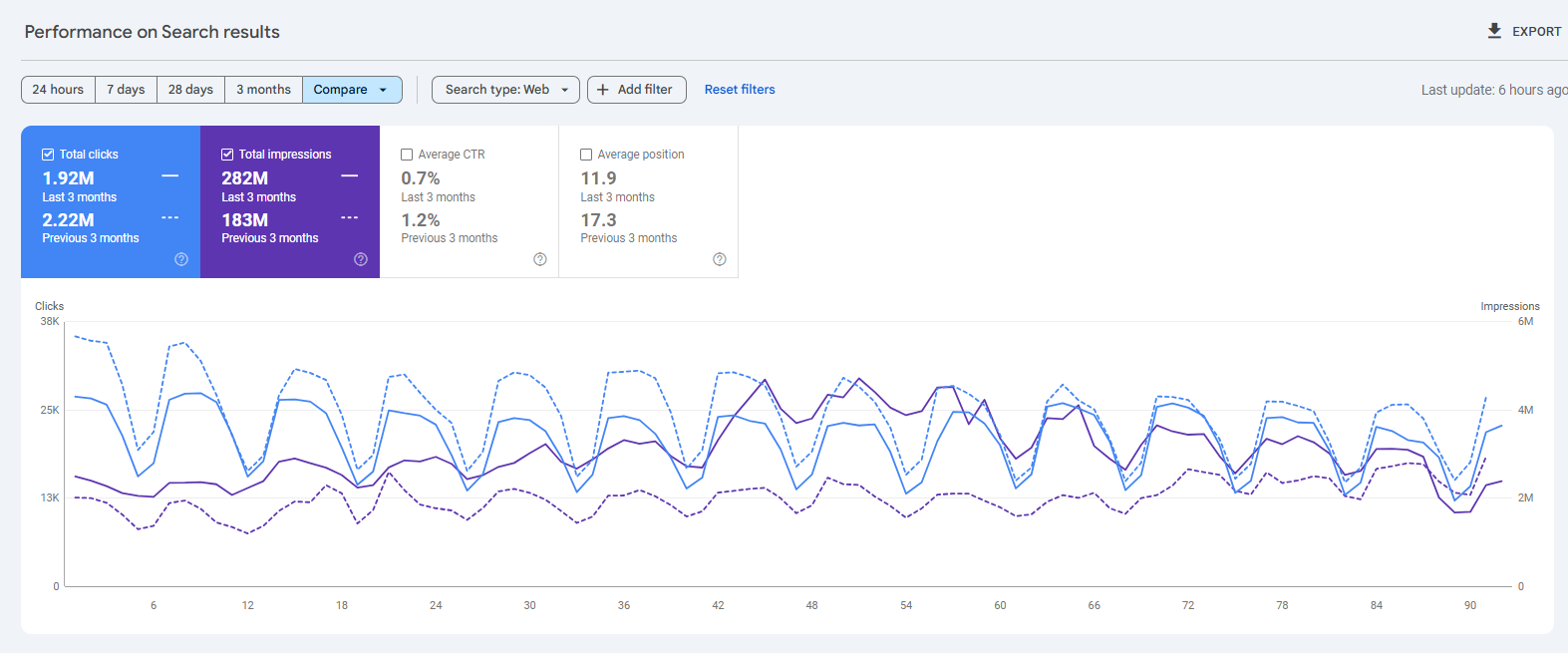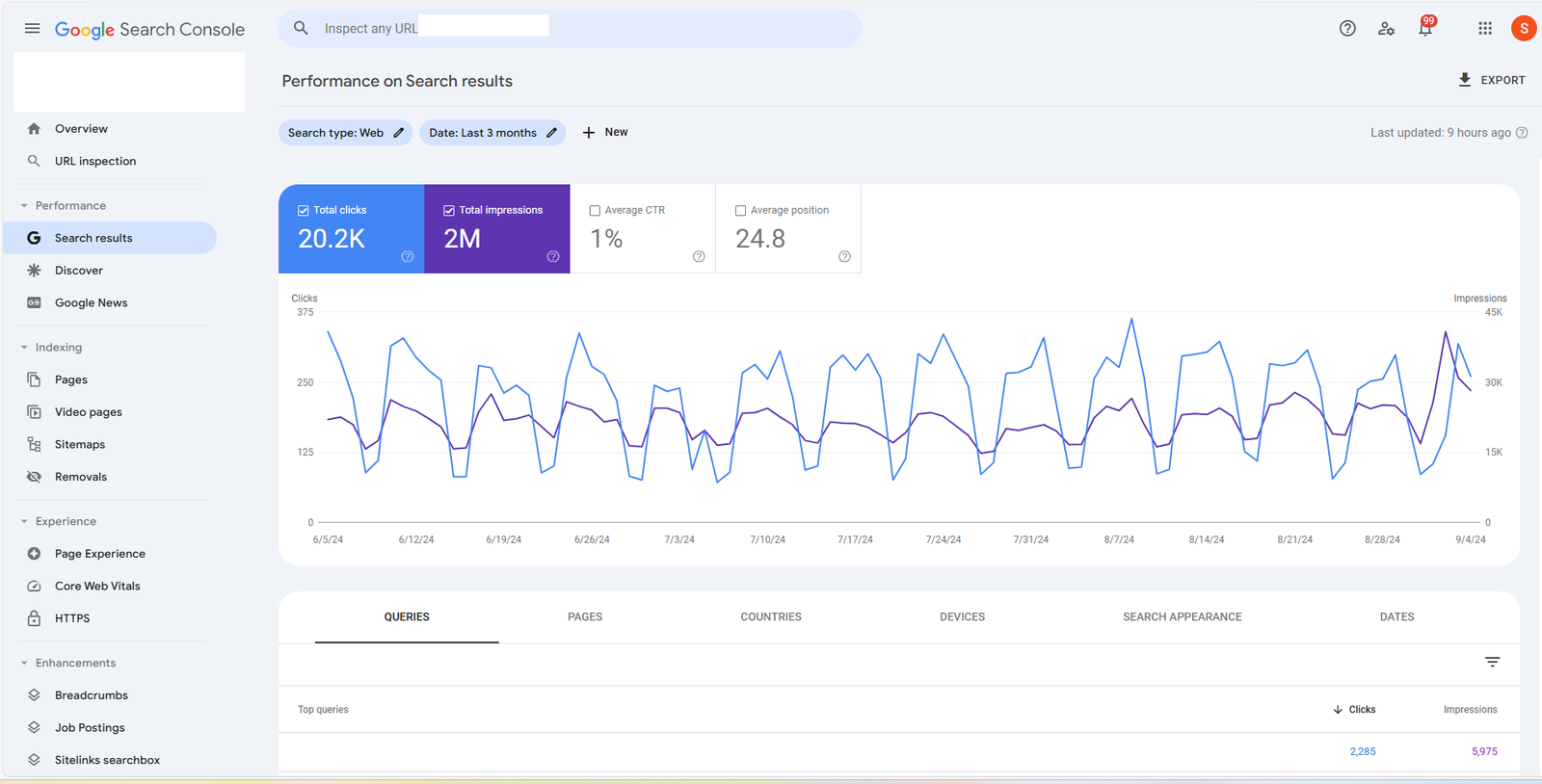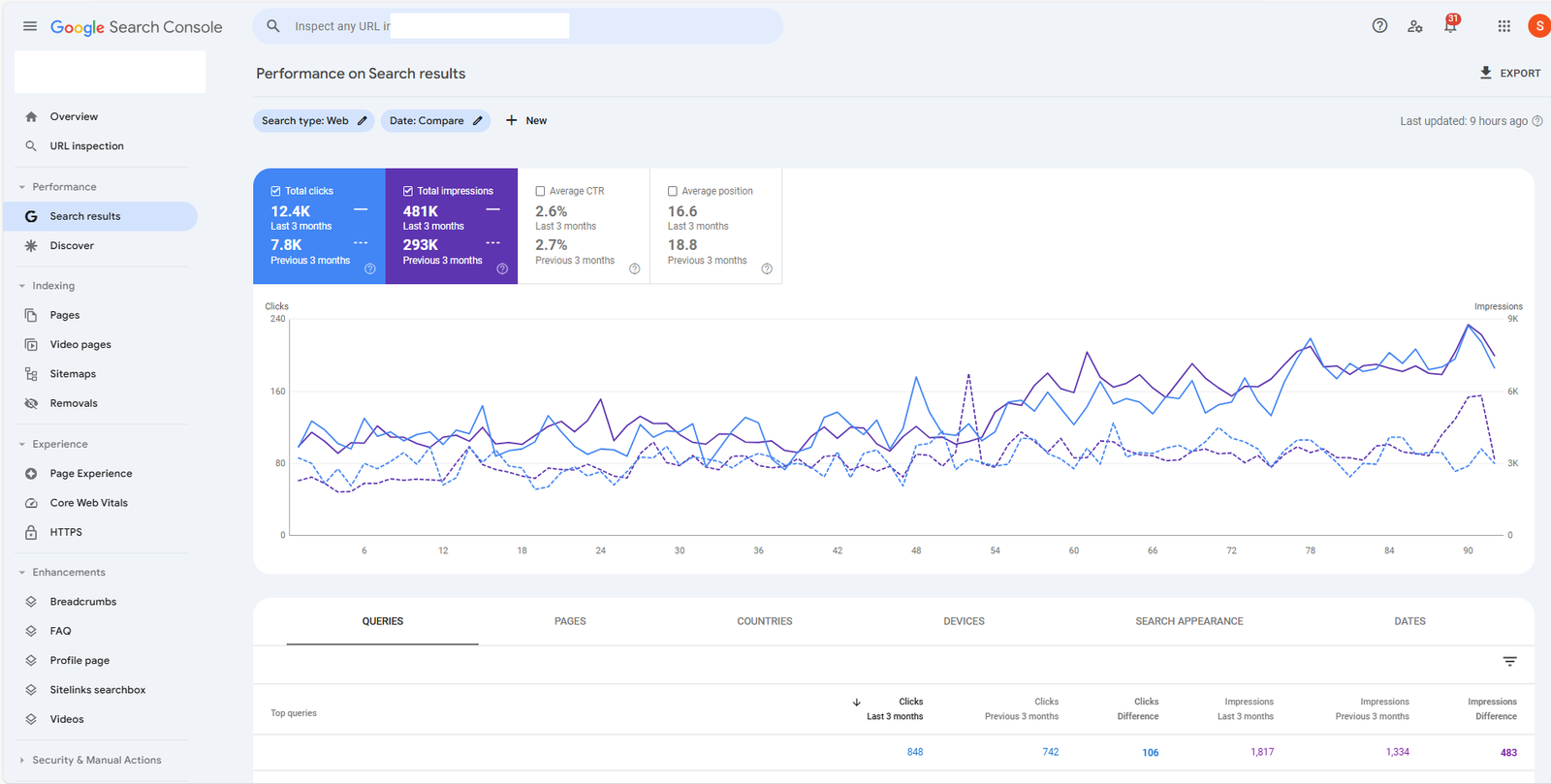Best SEO Tools
- Choosing the best SEO tools depends on goals—reporting, auditing, optimization, or automation requirements.
- SEO analysis tools help monitor performance, identify issues, and enhance search engine visibility effectively.
- The best SEO platform should offer scalability, automation, accurate analytics, and beginner-friendly dashboards.
- From SEO optimization tools to automated SEO tools, every tool improves rankings and streamlines content strategy.
What is an SEO Tool?
An SEO tool is a software or application that helps analyze, monitor, and improve your website’s visibility in search engines. From tracking keyword rankings and auditing site performance to researching competitors and optimizing on-page content, the best SEO tools automate and simplify tasks that would otherwise take hours. Whether you need an automated SEO tool, an SEO optimization tool, or an SEO monitoring tool, the goal remains the same—drive organic growth.
Comparison Table: Best SEO Tools in 2025
| Tool Name | Key Features | Best For | Ease of Use | Pricing (Start) | AI/Automation | Notable Use Case |
| Semrush | All-in-one SEO, keyword, content, backlink tools | Advanced SEO & competitor research | ⭐⭐⭐ | $139.95/mo | ⭐⭐⭐⭐ | Complete SEO campaigns |
| SE Ranking | Site audits, backlink checker, rank tracking, white-label reports | SEO audits & agency workflows | ⭐⭐⭐⭐ | $52/mo | ⭐⭐ | White-label client SEO reports |
| SEOptimer | Quick SEO audits, white-label reports, lead gen tools | Beginners and quick reports | ⭐⭐⭐⭐⭐ | $29/mo | ⭐ | Instant SEO reporting |
| Google Search Console | Crawl, indexing, Core Web Vitals, performance reports | Technical monitoring & indexing | ⭐⭐⭐ | Free | ⭐ | Organic traffic tracking |
| Google Analytics | Website traffic, goals, behavior analysis | Measuring SEO performance | ⭐⭐⭐ | Free | ⭐ | Audience & conversion insights |
| PageSpeed Insights | Core Web Vitals, mobile/desktop speed score | Website speed optimization | ⭐⭐⭐⭐ | Free | ⭐ | Page speed diagnostics |
| Google Trends | Real-time search interest and trend discovery | Content ideation & seasonality | ⭐⭐⭐⭐⭐ | Free | ⭐ | Trending topic discovery |
| AnswerThePublic | Question-based keyword and topic suggestions | Content and FAQ strategy | ⭐⭐⭐⭐ | $5/mo | ⭐⭐ | User-intent-based content planning |
| Ahrefs | Backlink audits, keyword research, competitor insights | Backlink building & SEO analysis | ⭐⭐⭐ | $129/mo | ⭐⭐⭐⭐ | Deep competitor SEO analysis |
| Google Keyword Planner | Keyword volumes, ad competition, CPC | Keyword research from Google data | ⭐⭐⭐⭐ | Free | ⭐ | PPC and SEO keyword foundation |
| Moz Keyword Explorer | Difficulty score, opportunity, priority, SERP features | Beginner-friendly keyword research | ⭐⭐⭐⭐ | $99/mo | ⭐⭐ | Prioritized keyword targeting |
| Screaming Frog | Site crawler for technical SEO and link auditing | In-depth technical SEO | ⭐⭐ | Free / $279/yr | ⭐ | Site architecture & crawl analysis |
| SEOmator | Technical audit tool covering on-page/off-page and backlinks | SEO audit depth for large sites | ⭐⭐⭐ | $49/mo | ⭐ | Comprehensive SEO audits |
| Surfer SEO | Content editor, keyword frequency, NLP insights | On-page SEO & blog optimization | ⭐⭐⭐⭐ | $79/mo | ⭐⭐⭐⭐ | Blog content SEO optimization |
| MarketMuse | Content briefs, topic modeling, competitive analysis | Long-form SEO strategy | ⭐⭐⭐ | $99/mo | ⭐⭐⭐⭐ | Topical authority building |
| TubeBuddy | Video SEO, tag suggestions, bulk tools | YouTube creators | ⭐⭐⭐⭐ | $3.6/mo | ⭐⭐ | YouTube video optimization |
| vidIQ | Video performance analytics, keyword insights, competitor tracking | Growing YouTube channel | ⭐⭐⭐⭐ | $416.58/mo | ⭐⭐ | YouTube keyword & SEO insights |
| KeywordTool.io | Long-tail keyword generator across platforms | YouTube, Google & Amazon keywords | ⭐⭐⭐⭐ | $69/mo | ⭐ | Long-tail keyword discovery |
| Claude Sonnet 3.7 | AI writing assistant, conversational content generation | Fast, contextual AI writing | ⭐⭐⭐⭐ | Free | ⭐⭐⭐⭐⭐ | AI-powered content creation |
| Mangools (LinkMiner) | Backlink checker, live link previews, trust/citation flow | Backlink audits for smaller sites | ⭐⭐⭐⭐ | $14.90/mo | ⭐ | Easy backlink analysis |
| Moz Link Explorer | Backlink profile, anchor text, spam score | Link profile research | ⭐⭐⭐⭐ | $99/mo | ⭐ | Domain authority and spam checks |
| GTmetrix | Page speed tests, Core Web Vitals, waterfall analysis | Speed and performance optimization | ⭐⭐⭐⭐ | Free / $4.25/mo | ⭐ | Website load time improvements |
| Rich Results Test | Schema markup and structured data testing | Structured data implementation | ⭐⭐⭐⭐⭐ | Free | ⭐ | Schema and rich snippet validation |
SEO Tools Breakdown: What to Choose and Why
| Name | Category | USD/month (Starting) | Features | AI Tools ✨ |
| Semrush | 💵 Paid | 139 | 🏆 🤖 ✍️ 🔍 🔗 | Yes |
| SE Ranking | 💵 Paid | 52 | 🏆 🤖 ✍️ 🔍 🔗 | Yes |
| SEOptimer | 💵 Paid | 29 | 🏆 🔍 | No |
| Google Search Console | 🎁 Free | 0 | 🏆 🤖 🔗 | No |
| Google Analytics | 🎁 Free | 0 | 🏆 🔍 🔗 | No |
| PageSpeed Insights | 🎁 Free | 0 | 🏆 🔍 | No |
| Google Trends | 🎁 Free | 0 | 🏆 🔍 | No |
| AnswerThePublic | 💵 Paid | 5 | 🏆 ✍️ 🔍 | Yes |
| Ahrefs | 💵 Paid | 129 | 🏆 🤖 ✍️ 🔍 🔗 | Yes |
| Google Keyword Planner | 🎁 Free | 0 | 🏆 🔍 | No |
| Moz Keyword Explorer | 💵 Paid | 49 | 🏆 🔍 | No |
| Screaming Frog | 💵 Paid | 23 | 🏆 🔍 | No |
| SEOmator | 💵 Paid | 49 | 🏆 🔍 🔗 | Yes |
| Surfer SEO | 💵 Paid | 79 | 🏆 🤖 ✍️ 🔍 | Yes |
| MarketMuse | 💵 Paid | 99 | 🏆 🤖 ✍️ 🔍 | Yes |
| TubeBuddy | 💵 Paid | 3.6 | 🏆 🔍 | Yes |
| vidIQ | 💵 Paid | 416.5 | 🏆 🔍 | Yes |
| KeywordTool.io | 💵 Paid | 69 | 🏆 🔍 | No |
| Claude Sonnet 3.7 | 💵 Paid | 17 | ✍️ 🔍 | Yes |
| Mangools (LinkMiner) | 💵 Paid | 14.95 | 🏆 🔍 🔗 | No |
| Moz Link Explorer | 💵 Paid | 49 | 🏆 🔍 🔗 | No |
| GTmetrix | 🎁 Free | 4.25 | 🏆 🔍 | No |
| Rich Results Test | 🎁 Free | 0 | 🏆 🔍 | No |
What Makes the Best SEO Tool?
From my perspective, a great SEO tool isn’t just about features—it’s about results, ease of use, support, and adaptability. The best SEO tools in 2025 should offer:
- Comprehensive SEO analytics and insights
- Real-time tracking and reporting
- Scalable options for websites of any size
- Actionable data rather than vanity metrics
- Affordable and flexible pricing plans
- User-friendly UI and efficient workflows
With that said, let’s dive into the top tools across various SEO categories.
Best Tools for SEO Reports
SEMrush
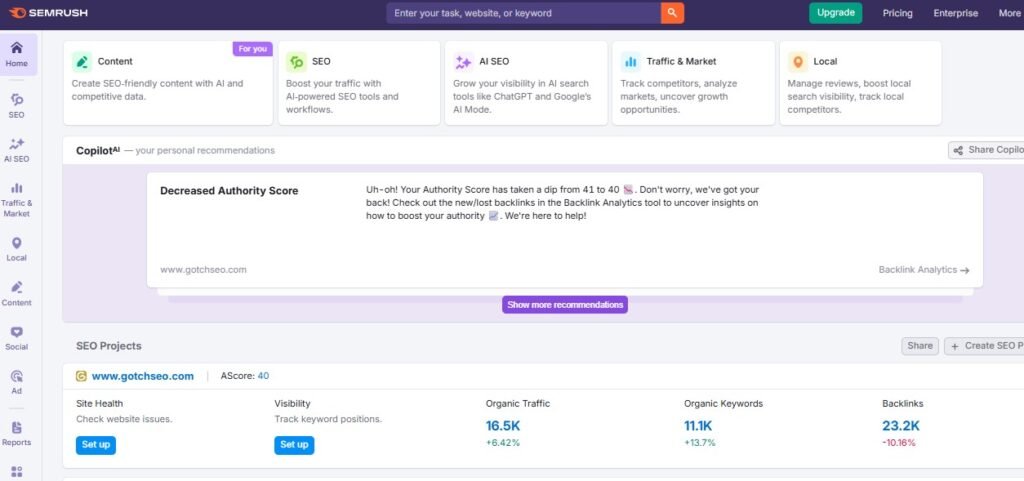
How I Use SEMrush’s On Page & Technical SEO Tools to Audit My Website
Step 1: Running a Site Audit to Catch SEO Errors
The first thing I do is run a Site Audit. This tool automatically scans my website and highlights technical errors that could affect SEO.
- I simply enter my domain, configure crawl settings, and start the audit.
- Once the scan completes, SEMrush provides a detailed health score and a list of issues.
- I immediately get insights like broken links, crawlability problems, and metadata errors.
What I love most? I can compare audits over time, so I track improvements or catch regressions easily. And I don’t have to set reminders—it runs automatically every week, so I always have up-to-date reports.
Step 2: Using the On Page SEO Checker for Content Optimization
Next, I move on to the On Page SEO Checker. This tool gives me practical suggestions to improve specific pages on my website.
- I select a page I want to optimize and let SEMrush analyze it.
- It shows me missing or weak title tags, meta descriptions, and H1 tags.
- I also get semantic keyword suggestions—terms related to my topic that I should naturally include.
The bonus? It even recommends domains I could target for backlinks, helping improve both my content and off-page SEO in one place.
Step 3: Analyzing Crawl Behavior with Log File Analyzer
To dig deeper into how search engines interact with my site, I use SEMrush’s Log File Analyzer.
- First, I download my access log file from the server using an FTP client.
- I make sure the file is named correctly (usually access.log) and under 1GB in size.
- Then, I upload it to the Log File Analyzer.
The tool then shows how often Googlebot crawls my pages, how crawl frequency varies by device (desktop vs. mobile), and which pages are being ignored.
This has helped me uncover issues in my site architecture—like orphan pages or poor internal linking—that were silently hurting my rankings. From there, I make updates that boost crawl efficiency and SEO performance.
Features : SEMrush is the tool I use most for building detailed SEO reports. Its features include keyword tracking, backlink audits, traffic analysis, and competitor benchmarking—all in one place. I rely on it to create custom, client-ready reports that highlight real performance metrics.
Pros:
- Accurate keyword and backlink data
- Customizable report templates
- Excellent for competitive analysis
- Great all-in-one reporting tool
Cons:
- Steep learning curve for new users
- Higher plans needed for full features
Pricing:
I use the Pro plan at $139.95/month as it covers all my reporting needs. Guru-$249.95/month and Business plans-$499.95/month are available with added historical data and white-label options, but I’ve found the Pro plan ideal for solo and small agency use.
My Opinion:
A powerful tool for detailed reports. I use it when handling large projects that require depth, accuracy, and flexibility.
SE Ranking
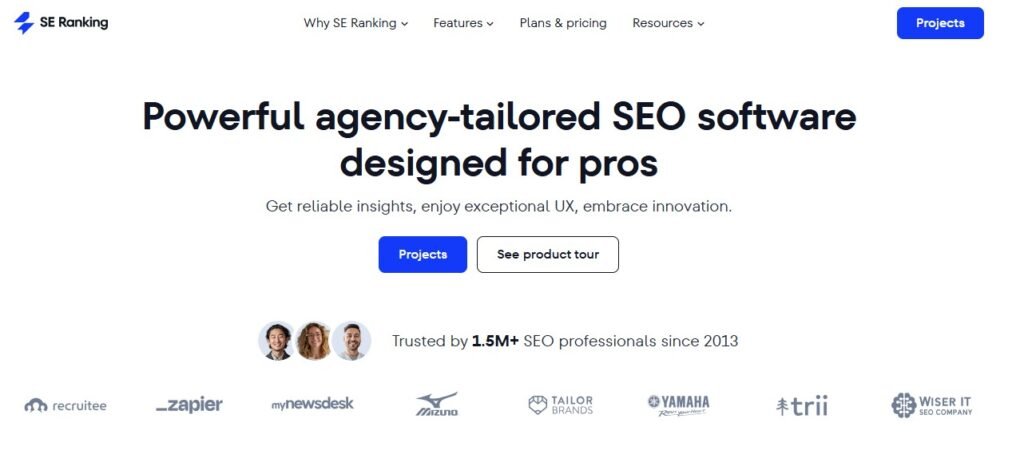
Features: SE Ranking is a tool I often use when I need solid SEO reporting without overcomplicating things. It offers features like keyword rank tracking, website audits, backlink monitoring, and competitive research. The interface is clean and the reports are easy to generate, especially for clients who prefer simplified visuals.
Pros:
- Easy-to-use reporting interface
- Affordable with good data accuracy
- White-label reporting available
- Great for tracking local SEO metrics
Cons:
- Less depth compared to premium tools
- Limited historical data on lower plans
Pricing:
I use the Essential plan at $52/month, which fits my reporting needs perfectly. There are also Pro-$95.20/month and Business plans-$207.20/month for agencies needing more project slots, keyword limits, and extended data access.
My Opinion:
Reliable and affordable for reporting. I prefer it when I need quick access to rankings, audits, and clean client exports.
SEOptimer
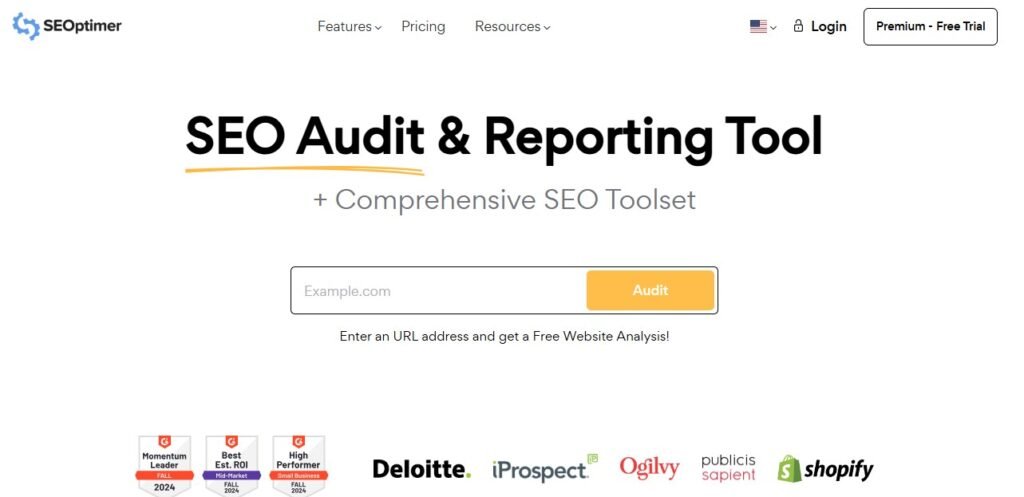
Features: I often use SEOptimer when I need fast, clear SEO audits. It checks on-page SEO, mobile usability, speed, and even basic backlinks. It’s perfect for quick overviews and client reports, especially for beginners.
Pros:
- User-friendly interface
- White-label report options
- Great for website optimization and content audits
Cons:
- Limited keyword research tools
- Not suitable for YouTube or advanced backlink tracking
Pricing: I use the Basic plan at $29/month because it covers my quick audit needs. SEOptimer also offers White Label at $39/month and Embedding options at $59/month for agencies.
My Opinion:
Best for simple, fast reports. I use it for quick audits or when clients need clear, non-technical SEO summaries.
Best SEO Tools for Beginners
Google Search Console
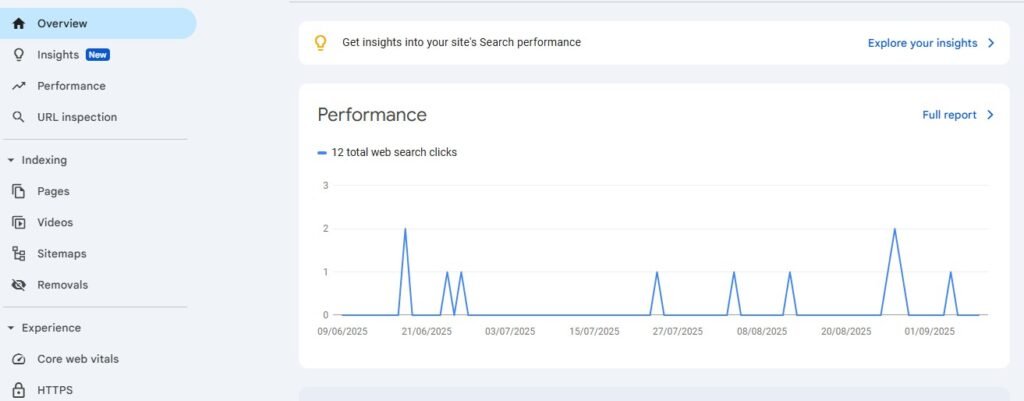
Features:
Absolutely essential for beginners. GSC provides insights directly from Google, including indexing issues, search queries, and click-through rates. I still use it for every project I run.
Pros:
- 100% free
- Accurate search performance data
- Simple to use
Cons:
- No keyword suggestions
- Basic interface
Pricing:
Free
My Opinion
Perfect for beginners starting SEO. I use it to monitor search performance, fix indexing issues, and track keyword visibility easily.
Google Analytics
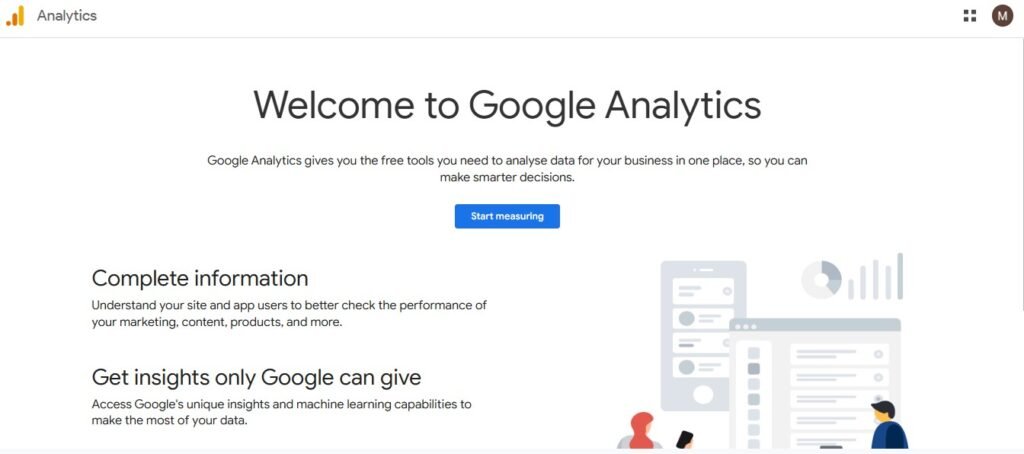
Features: Google Analytics was one of the first tools I used to understand how users interact with my website. It tracks traffic sources, user behavior, conversions, and engagement—making it essential for beginners trying to learn SEO performance metrics.
Pros:
- Free and beginner-friendly
- Detailed traffic and behavior insights
- Easy integration with other Google tools
Cons:
- Can feel overwhelming at first
- Limited keyword data for organic search
Pricing: Completely free. It’s still my top recommendation for anyone starting with SEO and wanting to measure what truly matters.
My Opinion:
Great for understanding user behavior. I depend on it to see how visitors interact with my site and which pages perform best.
Best SEO Tools for Website Optimization
PageSpeed Insights
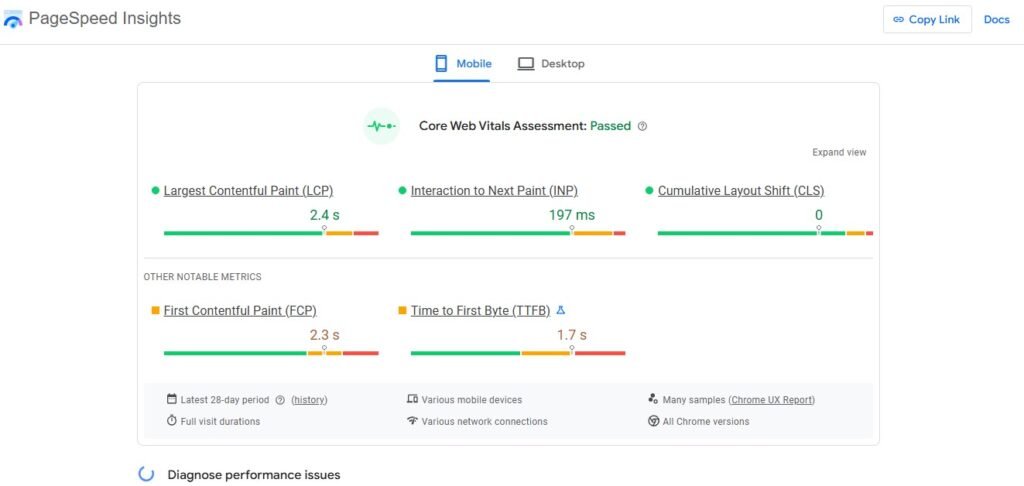
Features:
Speed is a ranking factor, and Google’s own tool, PageSpeed Insights, helps pinpoint performance issues. I’ve used it to troubleshoot slow client sites before launch.
Pros:
- Free and reliable
- Actionable insights for developers
- Measures both desktop and mobile
Cons:
- No site-wide reports
- Limited UX scoring
Pricing:
Free
My Opinion:
Ideal for optimizing site speed. I often use it to identify performance issues that directly affect rankings and user experience.
Google Trends
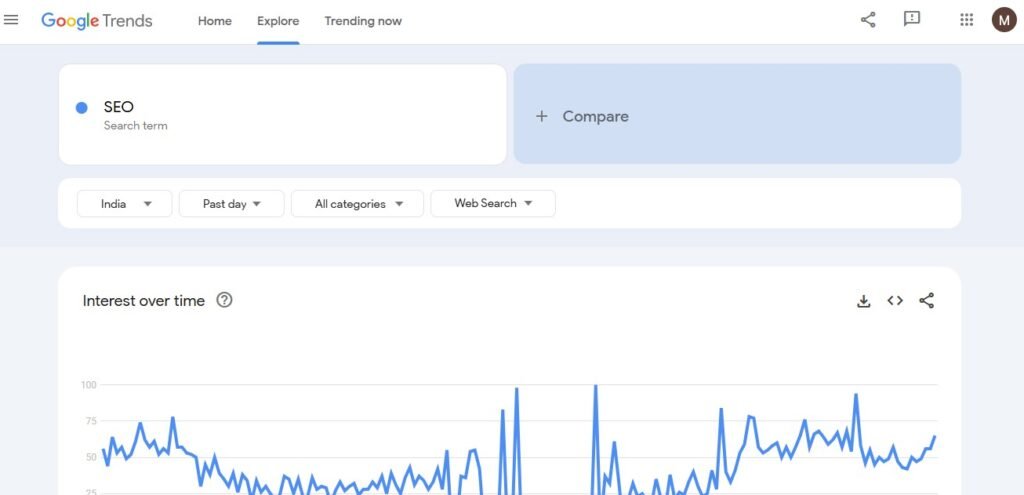
Features:
I often use Google Trends to identify rising search topics and seasonal trends. It helps me align my content strategy with what people are actually searching for. It’s a great way to stay relevant and optimize for user intent.
Pros:
- Real-time search trend data
- Easy comparison of keyword popularity
- Helps plan timely and relevant content
Cons:
- No detailed keyword volume
- Limited in-depth SEO metrics
Pricing:
Free to use. It’s one of my favorite tools for content planning and optimizing my site around trending search behavior.
My Opinion:
Helpful for spotting content opportunities. I use it to track trending topics and align my strategy with what users are searching.
AnswerThePublic
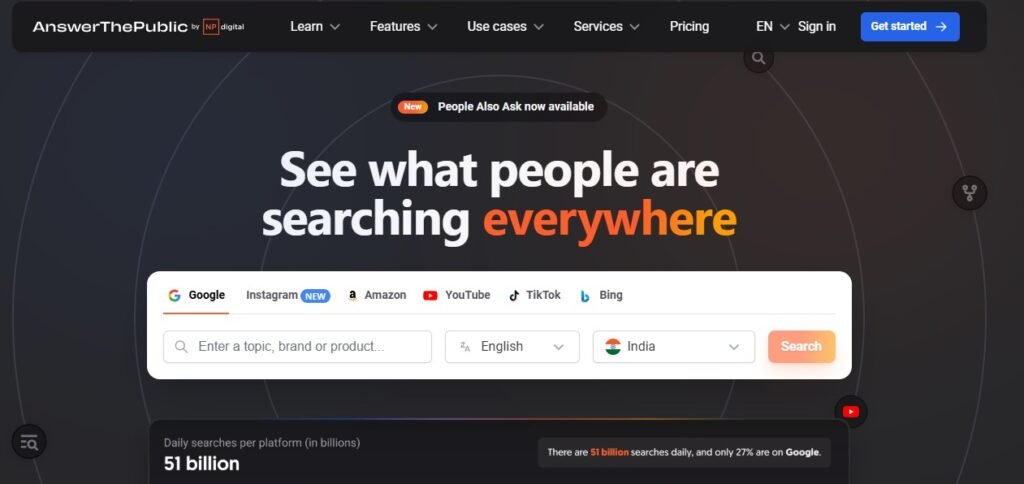
Features:
I use AnswerThePublic when I’m planning new content or optimizing existing pages. It shows what people are actually asking online around a keyword, which helps me create highly relevant and useful content.
Pros:
- Visual keyword question maps
- Great for uncovering user intent
- Helps fill content gaps effectively
Cons:
- Limited free searches
- No keyword volume or competition data
Pricing:
I use the Individual plan at $5/month, which suits my content planning needs. They also offer Pro at $49/month and Expert at $99/month for higher search limits and team access.
My Opinion:
Great for uncovering real user queries. I rely on it to shape content around questions I know my audience is asking.
.
Best Keyword Research Tools for SEO
Ahrefs

Features:
Ahrefs is one of the most powerful SEO analytics tools I’ve ever used. Its keyword research feature gives deep insights into keyword difficulty, volume, and competitor targeting.
Pros:
- Massive keyword database
- Competitor keyword gaps
- SERP overview per keyword
Cons:
- Expensive
- No free trial
Pricing:
Currently using the Standard plan at $299/month, which gives access to advanced keyword data and reports. Ahrefs also offers Lite ($129), Advanced ($499), and Enterprise ($1499) monthly plans.
My Opinion:
Powerful for deep keyword insights. I rely on it to analyze competition and find high-value terms for long-form content strategy.
Google Keyword Planner
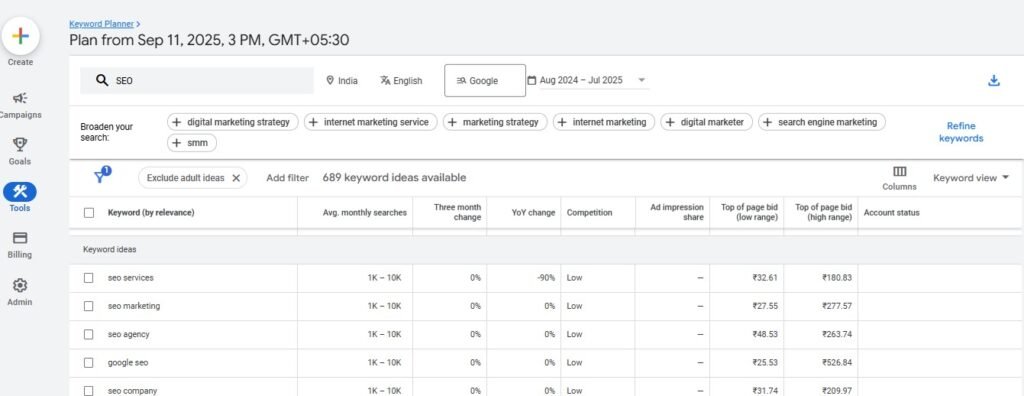
Features:
Google Keyword Planner is one of the first tools I turn to when starting keyword research. It gives keyword ideas, search volume, and competition data straight from Google, making it highly reliable for SEO planning.
Pros:
- Accurate search volume data
- Keyword suggestions based on real queries
- Integrates well with Google Ads
Cons:
- Data ranges can be too broad
- Requires a Google Ads account to access
Pricing: Free to use with a Google Ads account. It remains one of my top tools for building an effective SEO keyword strategy.
My Opinion:
Basic but reliable tool. I often refer to it when I need accurate keyword volume straight from Google’s ad data source.
Moz Keyword Explorer
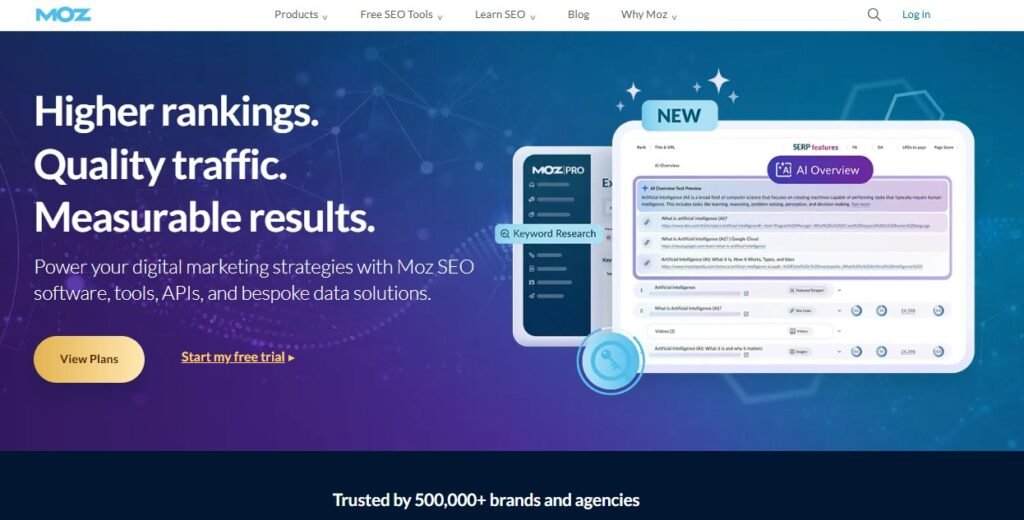
Features:
Moz Keyword Explorer is one of my go-to tools for finding keyword opportunities with real ranking potential. It offers metrics like keyword difficulty, opportunity, and priority, which helps me focus on keywords that can actually drive results.
Pros:
- Accurate keyword difficulty scoring
- Unique “priority” metric to guide strategy
- Easy-to-use interface for beginners
Cons:
- Limited daily searches on free plan
- Not as detailed as some competitors
Pricing:
Free with limited searches. The Standard plan at $99/month fits current needs for basic keyword tracking and competitor insights. Moz also offers Starter – $49/month,Medium ($179/month) and Large ($299/month)plans for growing SEO demands.
My Opinion:
Clean and beginner-friendly interface. I like using it when I need quick keyword suggestions with prioritization scores and SERP analysis.
Best SEO Audit Tools
Screaming Frog
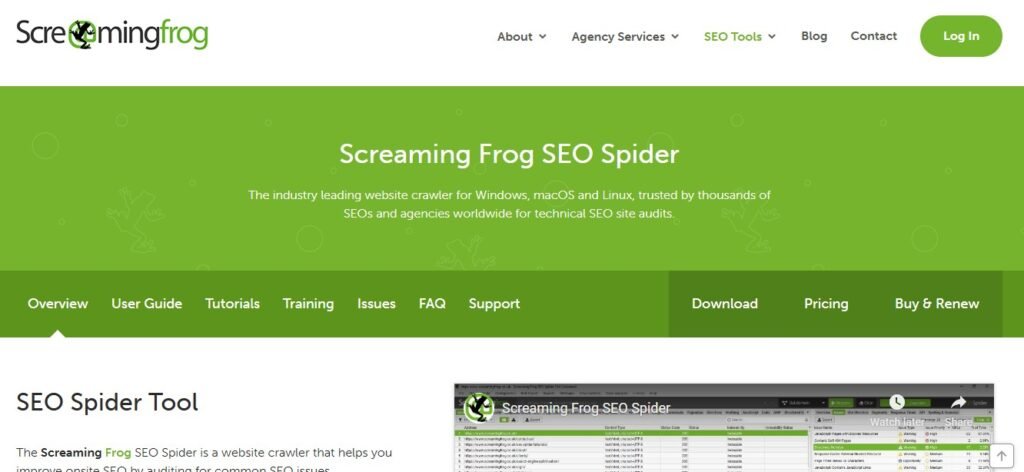
Features:
A staple in technical SEO, Screaming Frog crawls websites and finds issues like broken links, redirects, metadata problems, and more. I use it before every major website overhaul.
Pros:
- Deep website crawling
- Exportable audit reports
- Custom filters
Cons:
- Interface feels outdated
- Learning curve
Pricing:
The paid license at $279/year met my needs for advanced crawl data and audit exports. A free version is also available, but it’s limited to 500 URLs and fewer features.
My Opinion:
One of the most detailed audit tools. I use it to crawl sites and uncover technical issues that affect performance.
SEOmator
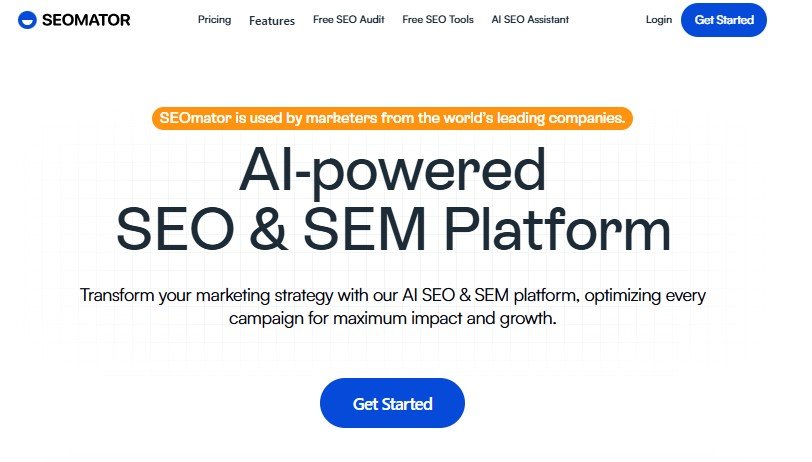
Features:
I use SEOmator when I need a deep, technical audit of a website. It analyzes everything from on-page SEO and mobile usability to site architecture, backlinks, and page speed. It’s especially helpful for identifying hidden technical issues.
Pros:
- Comprehensive technical SEO audits
- Covers on-page and off-page factors
- Useful for large websites
Cons:
- Interface can feel complex
- Takes longer to crawl big sites
Pricing:
Plans start at $49/month. For me, it’s one of the most detailed tools available, ideal when you need a full SEO health check. Other packages available are Standard – $99/month and Advanced – $279/month
My Opinion:
A great cloud-based auditing tool. I rely on it when I want automated reports covering both on-page and technical SEO aspects.
Best SEO Content Optimization Tools
Surfer SEO
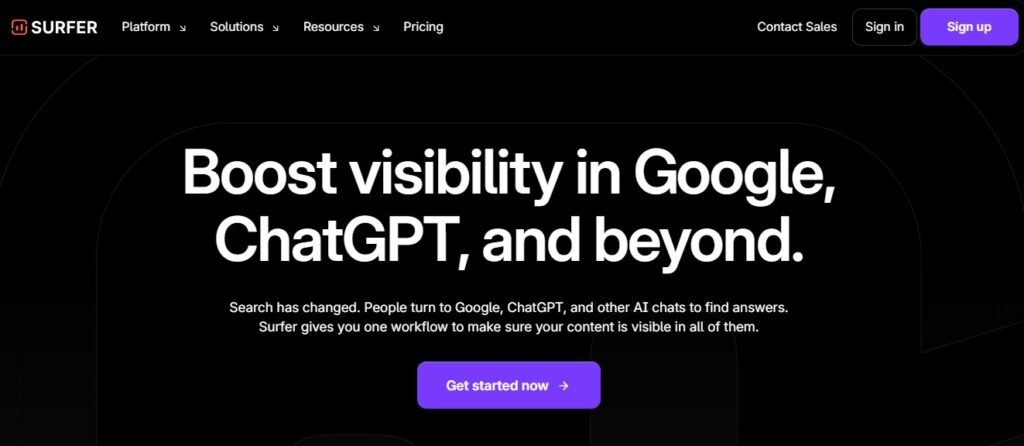
Features:
Surfer SEO is my secret weapon for content that ranks. It analyzes top-performing pages for a keyword and recommends on-page optimizations to match.
Pros:
- Data-backed content scoring
- Seamless Google Docs integration
- Real-time suggestions
Cons:
- Needs a solid content brief to begin
- Monthly limits on queries
Pricing:
The Essential plan at $79/month met my needs for optimizing individual blog posts with NLP guidelines. Surfer also offers Scale ($175/month) and Enterprise (custom) plans for larger teams.
My Opinion:
Excellent for content structure and keyword use. I follow its NLP guidelines when I want to optimize blog posts precisely and efficiently.
MarketMuse
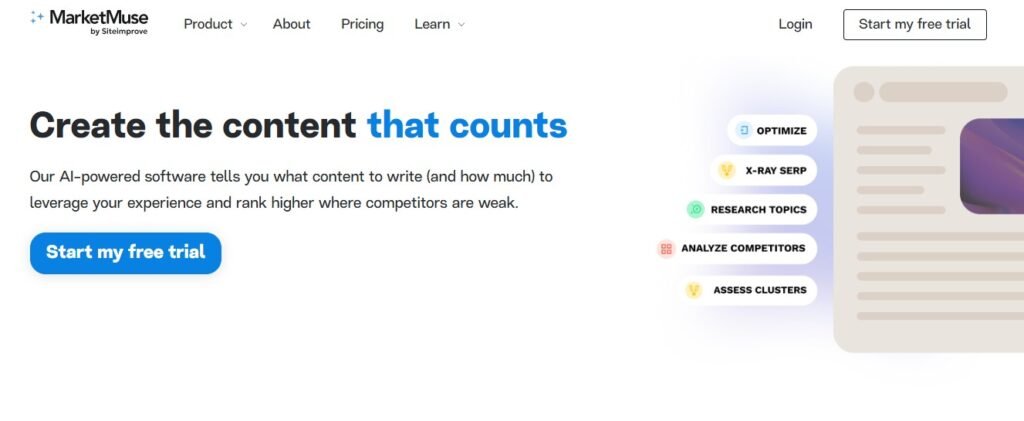
Features:
MarketMuse is my go-to tool for planning and optimizing long-form content. It helps me identify content gaps, suggests relevant subtopics, and scores content against top-ranking competitors. It’s ideal when I want to build topical authority.
Pros:
- AI-driven content suggestions
- Topic modeling and gap analysis
- Great for building in-depth content
Cons:
- Expensive for solo users
- Can be overwhelming for beginners
Pricing:
Free limited plan available; The Optimize plan at $99/month met my needs for optimizing long-form content and building topical authority. MarketMuse also offers a Free plan with limited credits and a Premium custom-priced plan for enterprises. Other Plans are Research – $249/month and Strategy – $499/month.
My Opinion:
Ideal for building topical authority. I use it when planning long-form content that needs strong internal linking and semantic depth.
Best SEO Tools for YouTube
Claude Sonnet 3.7
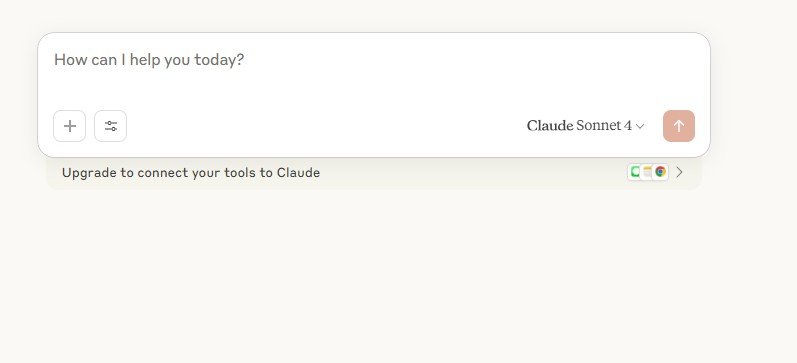
Features:
While not strictly an SEO tool, Claude Sonnet 3.7 helps me draft high-quality YouTube descriptions, titles, and tags using AI, improving visibility and engagement.
Pros:
- Great for content ideation
- Time-saving
- Understands YouTube tone
Cons:
- Lacks analytics
- Not video-specific
Pricing:
The Pro plan at $17/month met my needs for generating YouTube scripts and SEO-friendly titles. Claude also offers a free tier with usage limits and Max Plan – From $100/month for larger workflows.
My Opinion:
Helpful for scripting and idea generation. I often use it when I need keyword-rich YouTube scripts and engaging video outlines quickly.
TubeBuddy
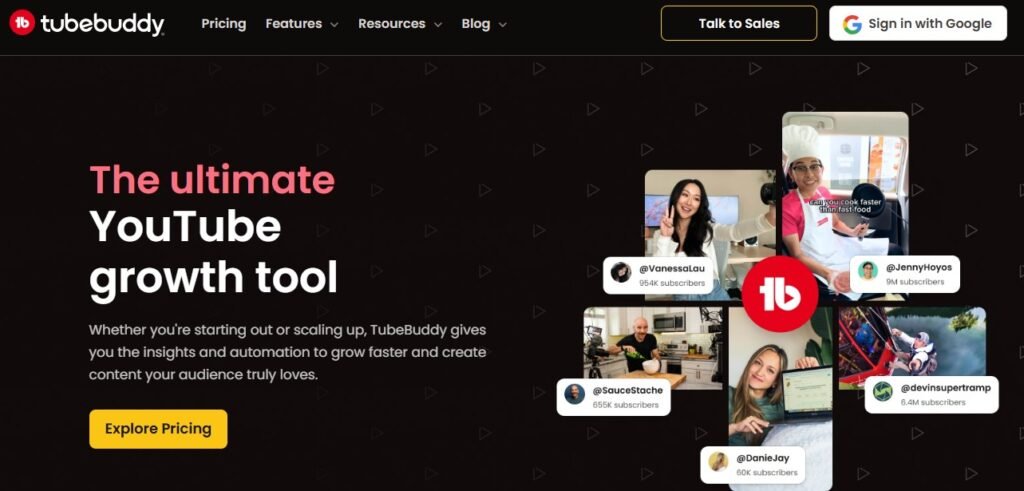
Features:
TubeBuddy is a browser extension I rely on to optimize my YouTube videos. It helps with keyword research, tag suggestions, thumbnail A/B testing, and SEO score analysis. It simplifies channel growth by providing actionable insights.
Pros:
- Easy-to-use interface
- Great keyword tagging tools
- Bulk processing for video edits
Cons:
- Limited free features
- Slight learning curve for beginners
Pricing: Free basic plan available; paid plans start at $3.6/month- Pro Plan. For me, it’s one of the most essential tools for growing a YouTube channel through smart, data-driven SEO. Other available plan is Legend – $23.19/month.
My Opinion:
Simple and effective extension. I use it to optimize tags, titles, and thumbnails, especially for improving video visibility and reach.
vidIQ
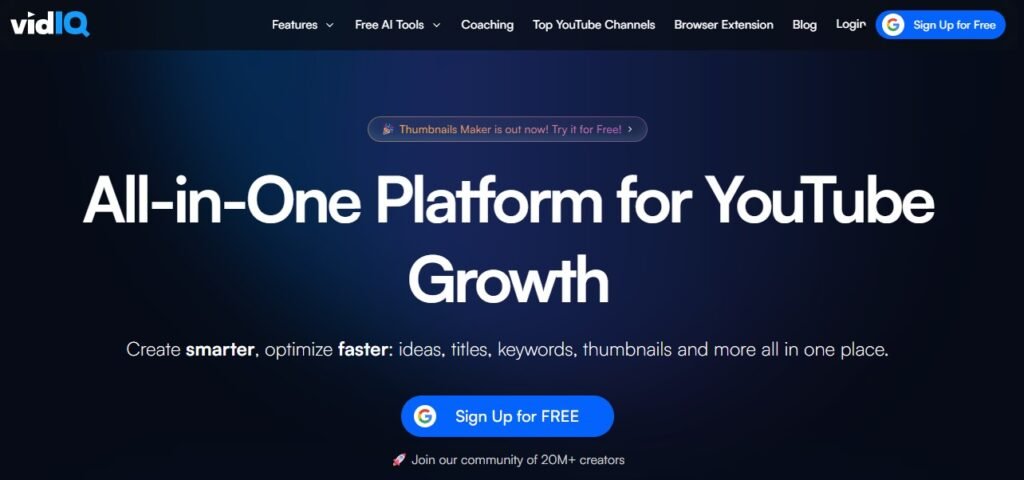
Features:
I use vidIQ alongside TubeBuddy to get a deeper look at my YouTube video performance. It offers real-time analytics, competitor tracking, SEO scores, and keyword recommendations. It’s helped me identify what’s working and adjust my content strategy.
Pros:
- Real-time video performance data
- Competitor insights and tracking
- Useful keyword tools and SEO suggestions
Cons:
- Free plan is very limited
- Data overload for new users
Pricing:
Free plan available; paid plans start at $416.58/month. It’s an excellent tool if you’re serious about optimizing every aspect of your YouTube presence.
My Opinion:
Great for tracking video performance. I rely on it to discover trending keywords and improve engagement through real-time analytics and insights.
KeywordTool.io
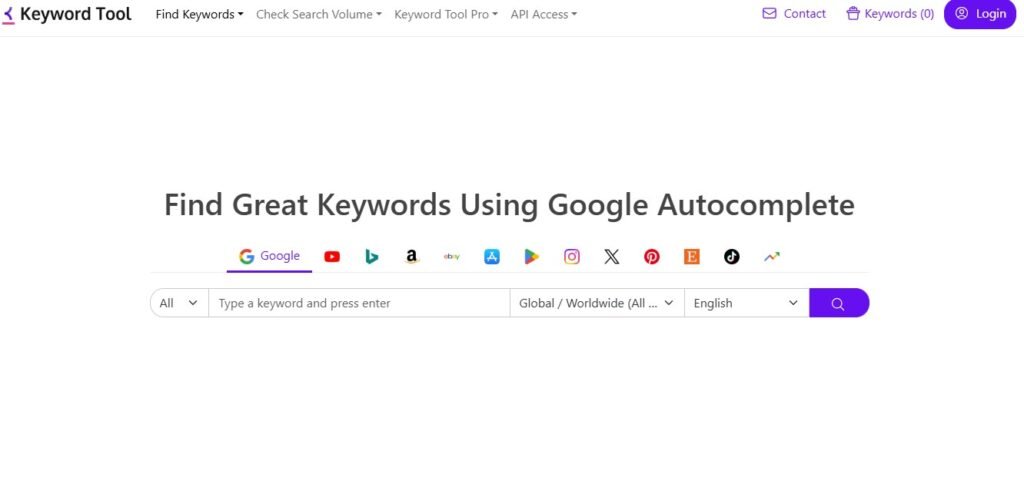
Features: When I need keyword ideas for YouTube titles, tags, or descriptions, KeywordTool.io is my first stop. It pulls autocomplete data from YouTube’s search bar, which helps me understand what users are actually searching for.
Pros:
- Generates long-tail keyword ideas
- Separate keyword sets for YouTube, Google, Bing, and more
- No account required for basic use
Cons:
- No keyword volume or competition data in free version
- Premium version is expensive
Pricing: Free for basic results; paid plans start at $69/month. Despite the price, I find it valuable for discovering hidden YouTube keyword opportunities.Other available plans are Pro Plus – $79/month and Pro Business – $159/month.
My Opinion:
Valuable for YouTube keyword discovery. I check it when I want autocomplete-based keyword ideas directly from YouTube’s search suggestions.
Best SEO Tools for Backlinks
Mangools
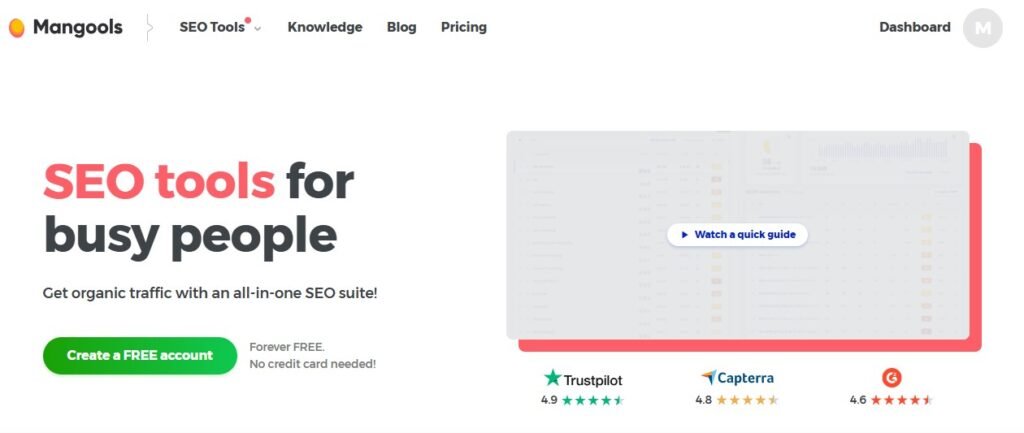
Features:
LinkMiner by Mangools is one of my favorite tools for quick and clear backlink analysis. I use it to check competitors’ backlinks, view link strength, and identify lost or new links. It’s visually intuitive and perfect for building a smart backlink strategy.
Pros:
- Clean, beginner-friendly interface
- Metrics like Citation Flow and Trust Flow
- Easy preview of linking pages
Cons:
- Limited database compared to larger tools
- Not ideal for large-scale link audits
Pricing:
Starts at $14.95/month. For small to mid-sized projects, it’s a solid tool that balances simplicity with useful backlink insights. Other plan are Premium – $22.45/month and Agency – $44.95/month.
My Opinion:
Great for backlink insights with a user-friendly interface. I use it to monitor new links and analyze competitor link profiles easily.
Moz Link Explorer
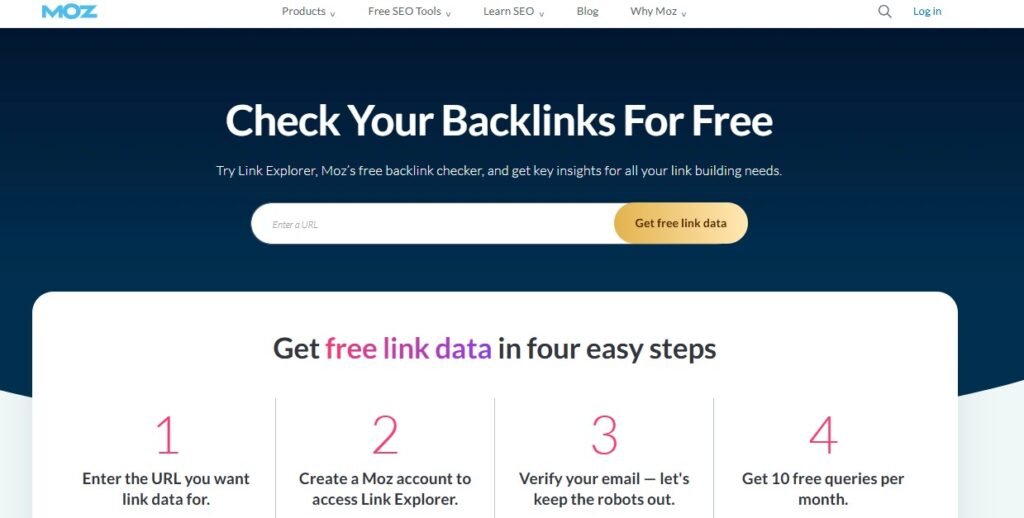
Features:
I often use Moz Link Explorer when I need a more detailed look at a site’s backlink profile. It helps me analyze domain authority, anchor text, linking domains, and spam scores. It’s reliable and great for competitive analysis.
Pros:
- Strong domain authority and spam score insights
- Easy-to-navigate interface
- Good for competitive backlink comparison
Cons:
- Limited data on free plan
- Slower updates compared to some other tools
Pricing:
Free with limited searches. The Standard plan at $99/month fits current needs for basic keyword tracking and competitor insights. Moz also offers Starter – $49/month,Medium ($179/month) and Large ($299/month)plans for growing SEO demands.
My Opinion:
Useful for checking domain authority and backlink quality. I turn to it when I need a quick overview of link opportunities.
Best Technical SEO Tools
Rich Results Test
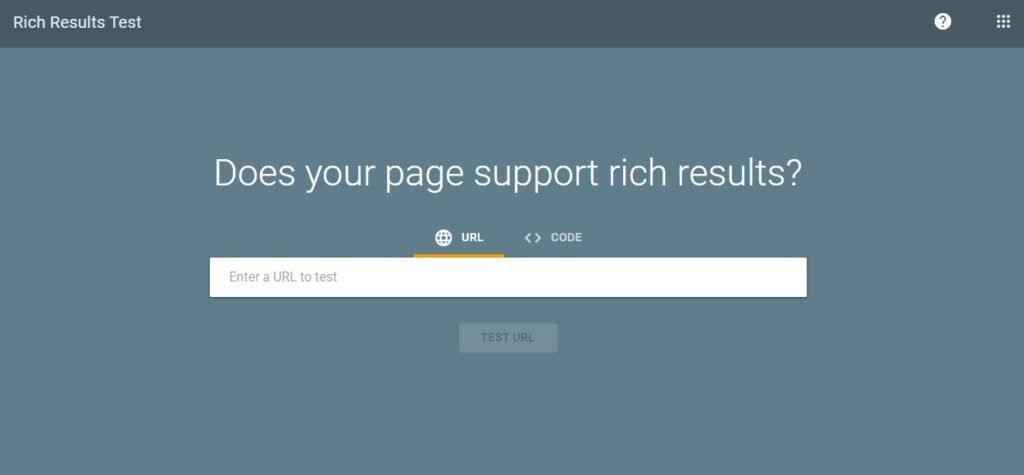
Features:
Great for checking if your page supports rich snippets like FAQs or reviews. I use it for schema validation before publishing content.
Pros:
- Instant validation
- Direct from Google
- Includes mobile preview
Cons:
- No bulk checks
- Doesn’t suggest improvements
Pricing:
Free
My Opinion:
Essential for structured data validation. I use it to check if my pages qualify for rich snippets in search results.
GTmetrix
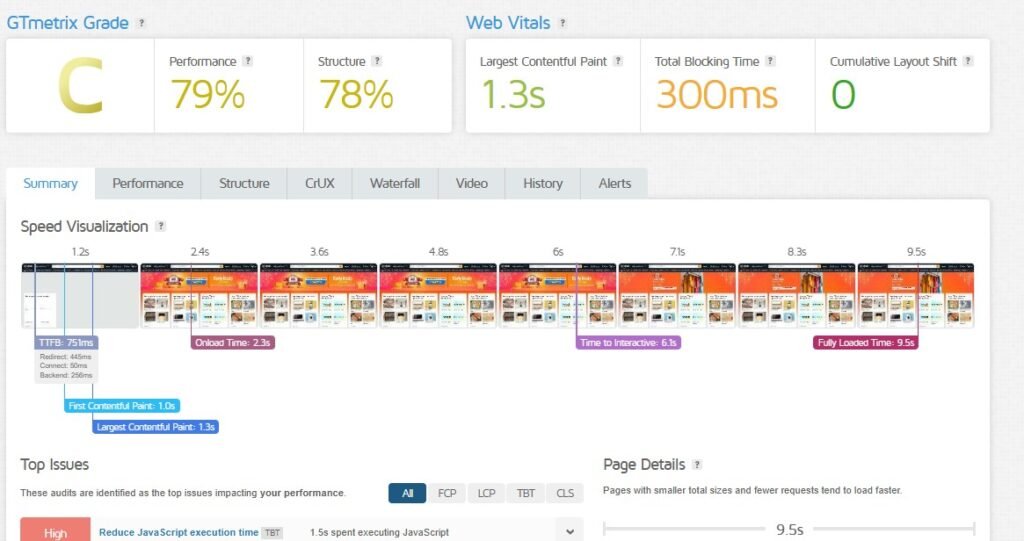
Features:
GTmetrix is my go-to tool for analyzing website speed and performance. It gives insights into loading time, page size, Core Web Vitals, and offers actionable suggestions to improve technical SEO. It’s essential for optimizing user experience and search visibility.
Pros:
- Detailed speed and performance reports
- Core Web Vitals analysis
- Easy-to-read recommendations
Cons:
- Limited features on free plan
- Requires technical knowledge to implement fixes
Pricing:
Free plan available; paid plans start at Micro- $4.25/month. I use it regularly to keep my sites technically sound and fast, which is crucial for SEO success. Other available plans are – Solo- $12.33/month, Starter – $23.75/month and Growth – $47.33.
My Opinion:
A go-to tool for performance checks. I rely on it to analyze page speed issues and improve Core Web Vitals.
Conclusion: How to Choose the Best SEO Tools for 2025
As we step deeper into the age of AI and automation, the number of SEO tools is growing exponentially. Choosing the best SEO tools depends entirely on your business needs, level of expertise, and marketing goals. Whether you’re seeking SEO analytics tools for reporting, automated SEO tools for scaling, or SEO monitoring tools for daily performance tracking, every tool in the comparison table above serves a specific function.
Here’s what I’ve personally learned after using dozens of these tools:
- Start with a clear SEO objective: If you’re new to SEO, start with tools like Google Search Console, Moz Pro, and Rank Math.
- Use a suite if you’re growing: Platforms like SEMrush, SE Ranking, and Morningscore offer broad SEO analytics tools that scale with your business.
- Automate where possible: Tools like SEO PowerSuite and DinoRANK let you automate SEO audits and reporting, saving time and effort.
- Focus on content optimization: Surfer SEO, Clearscope, and SEO.ai are must-haves if content is your main channel.
- Don’t ignore technical SEO: Tools like Screaming Frog, Rich Results Test, and Schemantra ensure your site’s foundation is solid.
Ultimately, the best SEO platform is the one that works for you, not just in terms of features, but in how it fits your workflow, your content strategy, and your marketing goals. The SEO optimization tools landscape will keep evolving, so adaptability and continuous testing should be part of your SEO mindset.
Frequently Asked Questions about Best SEO Tools
1. What is the purpose of SEO tools?
SEO tools help analyze, track, and optimize websites to improve search engine visibility.
2. Are free SEO tools enough for beginners?
Yes, free tools like Google Search Console and Analytics are great starting points.
3. Which SEO tool is best for keyword research?
Ahrefs, Semrush, and Google Keyword Planner are top choices for keyword research.
4. Do SEO tools guarantee higher rankings?
No tool guarantees rankings, but they provide insights to improve SEO strategy.
5. How do I choose the right SEO tool?
Pick based on goals, budget, ease of use, and features that fit your SEO needs.


